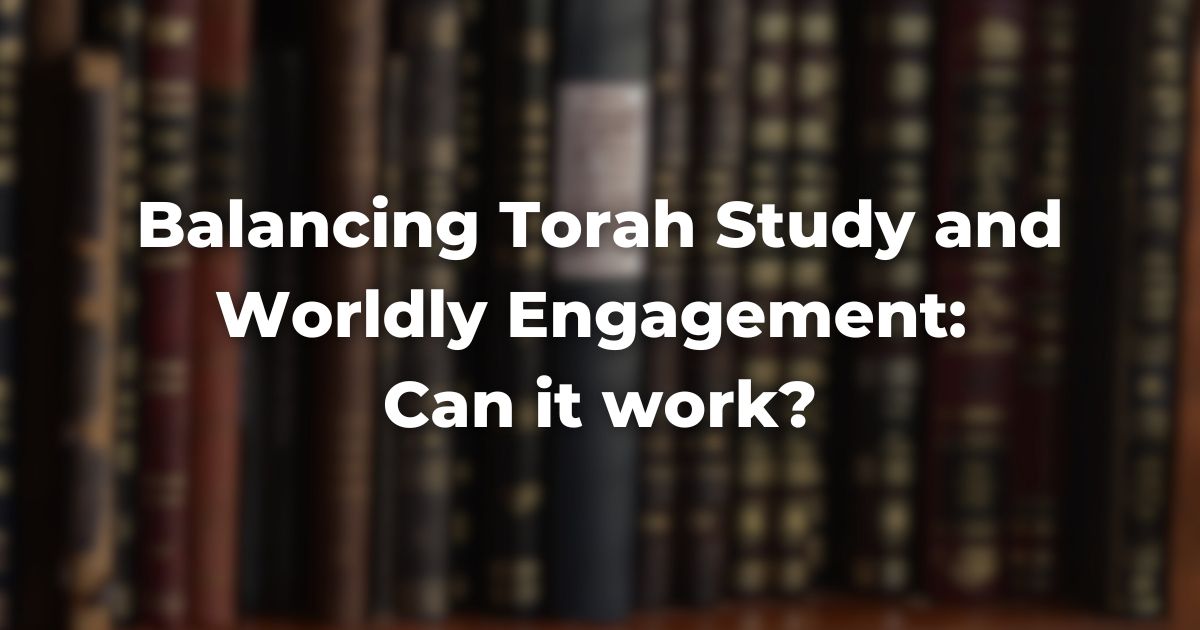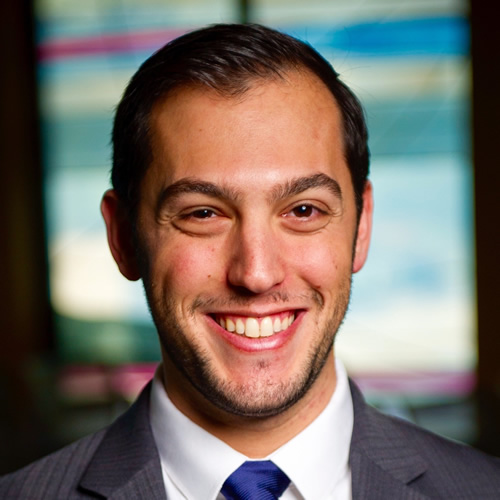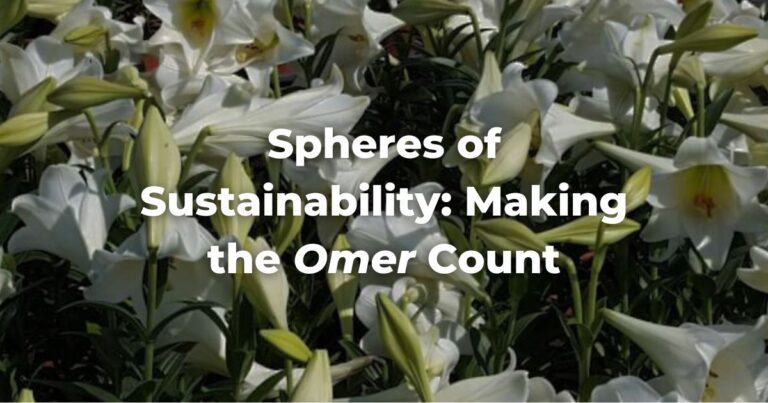For many, the dilemma of how to balance TorahRefers to the first five books of the Hebrew Bible, the Tanakh, also called the Five Books of Moses, Pentateuch or the Hebrew equivalent, Humash. This is also called the Written Torah. The term may also refer to teachings that expound on Jewish tradition. Read more study with work is a deeply personal one. The tension between spiritual obligations and material responsibilities is not just a theoretical debate; it’s a lived experience that shapes our daily choices.
My father faced this very dilemma.
As a carpenter, his days were filled with the demands of his craft. Yet he never allowed his work to overshadow his commitment to Torah. Every evening, after a long day at the workshop, he would immerse himself in study, his eyes alight with the same passion he brought to his woodworking. His life was a testament to the possibility of living fully in both worlds.
He taught me how to combine Torah with Derech Eretz.
The balance between Torah study and worldly engagement has been a central question in Jewish thought for centuries. In the TalmudReferring to one of two collections, the Jerusalem and Babylonian Talmuds, edited in the 6th century, that contains hundreds of years of commentary, discussion, and exploration of the ideas in the Mishnah. One could describe it as Mishnah + Gemara = Talmud Read more (Berakhot 35b), a debate between Rabbi Yishmael and Rabbi Shimon Bar Yochai addresses this issue. Their differing views not only reflect timeless concerns but also provide frameworks for navigating our modern lives.
Rabbi Yishmael promotes a balanced approach, interpreting the verse “And you shall gather your grain” (Deuteronomy 11:14) as an endorsement of combining Torah study with work. He argues that people should “conduct themselves in the way of the world,” engaging in labor while maintaining a commitment to Torah. This perspective recognizes the practicalities of daily life and the necessity of worldly engagement for societal stability.
Rabbi Shimon Bar Yochai, however, idealizes a society where the righteous devote themselves entirely to Torah, with their material needs miraculously provided. For him, the spiritual ideal of uninterrupted Torah study transcends mundane concerns. While inspiring, this vision is less practical for most people..
The tension between these views is emblematic of broader debates about spirituality and materiality.
Rabbi Yishmael’s approach aligns with the belief that engagement with the world is a divine mandate, one that reflects the principle of tikkun olam, repairing the world. By participating in worldly endeavors, individuals not only sustain themselves but also contribute to the collective well-being of society.
Rabbi Shimon Bar Yochai’s stance, on the other hand, calls for an aspirational focus on divine service, prioritizing spiritual elevation over material pursuits.
This dichotomy of Torah study perspectives challenges each generation to determine the appropriate balance for their time and circumstances.
Maimonides (Rambam) builds on Rabbi Yishmael’s perspective, advising that one should work to meet basic needs while dedicating the majority of their time to Torah study. In his teachings (Laws of Torah Study 3:9, 1:12), Maimonides proposes a daily schedule of three hours of work and nine hours of Torah study. This disciplined model reflects an ideal where material sustenance supports spiritual growth without dominating one’s life. By structuring time intentionally, Maimonides underscores the importance of prioritizing Torah while acknowledging the necessity of work.
However, Rabbi Shimon Bar Yochai’s vision is not dismissed but rather serves as an aspirational ideal. Rabbi Abraham Isaac Kook elaborates on this tension in his commentary “Ein Ayah.” He explains that while some exceptional individuals may transcend worldly concerns, the Torah’s teachings are designed for the majority, who must balance spiritual growth with practical responsibilities. Rabbi Kook emphasizes that the Torah was given to human beings with real-world limitations, not to angels. This perspective grounds Jewish practice in the reality of human experience while leaving room for the exceptional few who can dedicate themselves entirely to Torah.
The MishnahA collection of rabbinic teachings edited in Israel around 225 CE. Organized in six sedaraim by subject matter and dealing with both ritual and civil law. Both the Jerusalem and Babylonian Talmud are expansive discussions of the Mishnah. Read more in Pirkei Avot (2:2) encapsulates this balance: “Beautiful is Torah with worldly work, for the toil of both drives away sin. All Torah study that is not accompanied by work will ultimately cease and lead to sin.” This teaching underscores the symbiotic relationship between spiritual and material pursuits, suggesting that integrating both dimensions leads to a virtuous and sustainable life. It warns against neglecting either aspect, as an imbalance can result in spiritual stagnation or material instability.
In modern times, this balance is more relevant than ever. The demands of contemporary life often pull individuals away from spiritual pursuits. Extended work hours, financial pressures, and societal expectations can make it challenging to dedicate time to Torah study.
Yet, the teachings of Rabbi Yishmael and Rabbi Shimon Bar Yochai remind us that even amidst these challenges, prioritizing Torah is essential. For those engaged in rigorous professional or family responsibilities, setting aside even a small amount of time daily for Torah learning can provide spiritual nourishment and clarity.
Conversely, those immersed in full-time Torah study must also reflect on their contribution to the broader community. The principle of derech eretz (worldly engagement), teaches that Torah study should not occur in isolation. It must be accompanied by an awareness of societal needs and a commitment to bettering the world. The ideal balance may vary from person to person, but the underlying principle remains: both Torah and work are integral to a meaningful life.
Historical examples further illuminate this balance. Communities that emphasized only material pursuits often faced spiritual decline, while those that focused solely on Torah sometimes struggled with economic hardship, as we can sometimes see in Ultra Orthodox communities in Israel. Successful communities integrated both elements, creating environments where individuals thrived spiritually and materially. This harmony reflects the wisdom of the Talmudic sages and their enduring relevance.
Rabbi Shimon Bar Yochai’s ideal may resonate in moments of heightened spirituality, such as during festivals, retreats, or personal milestones. These occasions remind us of the transformative power of Torah study and the importance of aspiring to higher ideals. Meanwhile, Rabbi Yishmael’s practical approach anchors us in the day-to-day realities of life, ensuring that our spiritual aspirations remain grounded and sustainable.
In reflecting on these teachings, we must ask ourselves:
- Are we allocating sufficient time to Torah study while contributing to the world’s betterment?
- Are we striking the right balance between spiritual and material pursuits?
The answers will differ for each individual, influenced by their unique circumstances, abilities, and aspirations. While Rabbi Yishmael’s perspective may align more closely with the everyday experiences of most individuals, Rabbi Shimon Bar Yochai’s vision serves as a reminder of the spiritual heights we can strive to reach.
May you strive to integrate the wisdom of Rabbi Yishmael with the idealism of Rabbi Shimon Bar Yochai, creating lives that honor both the spiritual and the practical.
By finding this balance, you fulfill the vision of a harmonious existence where Torah study enriches your engagement with the world, and worldly work supports your spiritual growth. This integration not only benefits you individually but also contributes to a world that reflects the divine harmony envisioned by our sages.
Dedicated to my beloved father who combined Derech Eretz with Talmud Torah, and passed away 2 years ago. May his memory be for a blessing.
Authors
-

Rabbi Jeremy Markiz is a teacher and consultant. Based in the Washington, DC area, he teaches the Torah of personal growth, meaning and intentionality, and making the world a better place. He writes a newsletter called, With Torah and Love. Rabbi Markiz helps clergy, congregations, and Jewish organizations grow and communicate clearly in the digital world, develop effective strategies, and solve problems with his consulting firm, Next Level Rabbinics.
View all posts -

Tsvia Weisberger is a second year rabbinical student at the Shechter Institute for Rabbinic Training in Jerusalem. She was a fellow in the first cohort of the Exploring Judaism's Writer's Fellowship. Tsvia has a BA in Bible and Jewish studies and a MA in Jewish education from the Hebrew University. She is also a teacher and educator at the Jerusalem Academy of Music and Dance high school and in other settings.
View all posts







